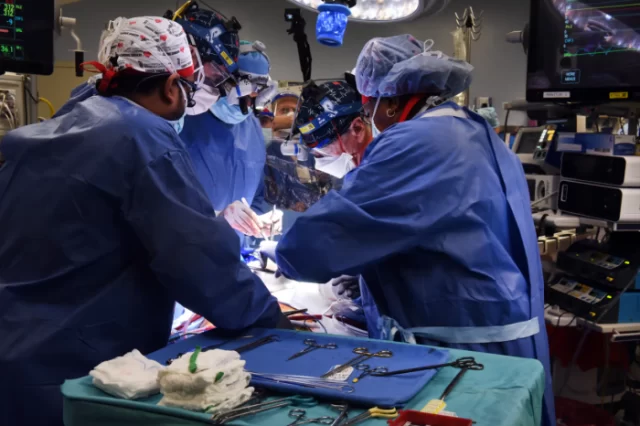Cause of death of first man to receive pig heart transplant remains a mystery
- Normal Liver Cells Found to Promote Cancer Metastasis to the Liver
- Nearly 80% Complete Remission: Breakthrough in ADC Anti-Tumor Treatment
- Vaccination Against Common Diseases May Prevent Dementia!
- New Alzheimer’s Disease (AD) Diagnosis and Staging Criteria
- Breakthrough in Alzheimer’s Disease: New Nasal Spray Halts Cognitive Decline by Targeting Toxic Protein
- Can the Tap Water at the Paris Olympics be Drunk Directly?
Cause of death of first man to receive pig heart transplant remains a mystery
- Should China be held legally responsible for the US’s $18 trillion COVID losses?
- CT Radiation Exposure Linked to Blood Cancer in Children and Adolescents
- FDA has mandated a top-level black box warning for all marketed CAR-T therapies
- Can people with high blood pressure eat peanuts?
- What is the difference between dopamine and dobutamine?
- How long can the patient live after heart stent surgery?
NEJM: Cause of death of first man to receive pig heart transplant remains a mystery.
A new article published in the New England Journal of Medicine provides an in-depth look at the world’s first pig heart transplant in humans earlier this year.
The patient died unexpectedly nearly two months after surgery, and the exact cause of death remains unclear, the researchers report.

In early 2022, surgeons in the United States performed a historic operation to transplant the heart of a genetically modified pig into a human for the first time.
This highly experimental procedure is authorized by the U.S. Food and Drug Administration (FDA) under the Compassionate Use Terms. The patient was a man in his 50s with end-stage heart disease who was too ill to be eligible for a routine heart transplant.
The transplant was initially successful, and within days of the transplant, the patient was off the heart-lung bypass machine that had previously kept him alive.
He began physical recovery and showed impressive signs of recovery within a few weeks.
Surgeon Bartley Griffith, who led the milestone project, explained: “We are incredibly encouraged by his progress. His heart is strong, almost too strong for his frail body, but he has a strong will to survive. . He told me he wanted to go home and see his dog, Lucky.”
For about seven weeks, the transplant was working well and the patient showed no usual signs of organ transplant rejection.
Unfortunately, around day 49, the transplanted heart began to show signs of failure, and within two weeks, the patient had died.
In a newly published report, the researchers behind the world-first operation describe the circumstances that led to the patient’s death.
The official cause of death was heart failure, however, the organ failed not because it was rejected.
When the hearts were dissected, the researchers found that the transplanted pig hearts showed dramatic thickening of the walls of the ventricles.
“Our autopsy results showed no evidence of rejection,” Griffith said. “Instead, we saw thickening and subsequent stiffness of the heart muscle leading to diastolic heart failure, meaning the heart muscle was not able to relax as much as it should and allow The heart is full of blood.”
This tissue behavior is inconsistent with what is typically seen when organs are rejected, the report noted.
At this point, it is unclear exactly what mechanisms are responsible for this particular organ damage.
A few months ago, it was revealed that transplanted pig hearts had been found to contain traces of a virus known as porcine cytomegalovirus.
It has been speculated that the virus may play a role in organ failure by stimulating an immune response that causes damage to heart tissue.
However, the new report calls into question this hypothesis, finding no trace of the virus spreading to organs other than the pig’s heart.
While it is still possible that a latent virus in the pig heart is responsible for the tissue damage, the researchers believe this hypothesis warrants further investigation.
The presence of the swine virus in transplanted heart tissue remains a major concern for researchers because of extensive testing before the organs are used.
The donated pigs themselves are also raised in a secure facility designed to prevent cytomegalovirus infection in pigs.
Safeguards will be improved in the future to prevent the virus from infecting pigs raised for human transplants, said Muhammad Mohiuddin, co-leader of the study.
“We thought it was an important learning experience,” Mohiuddin said. “Learning what we know now, we will change some of our practices and techniques in the future.”
Ultimately, this historic procedure is only the first step in a long journey towards successful xenotransplantation. E. Albert Reece, Dean of the University of Maryland School of Medicine, pointed out that the courage of patient David Bennett is fundamental to advancing the field, hoping to save more lives in the future.
“This report will provide important information for the allotransplantation research community and will play a key role in advancing the field,” said Reece. “I am very proud of the historic medical achievements of leaders in these fields and Hopefully these first brave steps, including that of Mr Bennett, will lead to a long-term solution where no patient will die waiting for an organ transplant.”
The report was published in the New England Journal of Medicine .
NEJM: Cause of death of first man to receive pig heart transplant remains a mystery
(source:internet, reference only)
Disclaimer of medicaltrend.org
Important Note: The information provided is for informational purposes only and should not be considered as medical advice.



